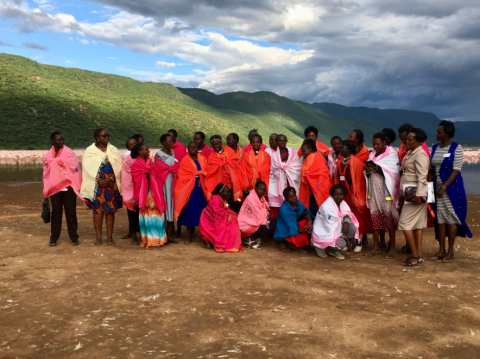
Endorois Women lead on land rights struggle
From 8-11 May 2018, the Women and ESCR Working Group and the Strategic Litigation Working Group of ESCR-Net collaborated with our member, the Endorois Welfare Council (EWC), in facilitating a workshop on human rights principles and organizing for Endorois women leaders at Lake Bogoria in Kenya. 34 Endorois women, including a number of youth leaders, from 15 different locations participated.
Background
In the 1970s, the Kenyan government evicted hundreds of Endorois families from their land around Lake Bogoria to create a game reserve for tourism. Following many years of struggle by the Endorois, the African Commission on Human and Peoples’ Rights (ACHPR) delivered an unprecedented judgment recognizing that the Kenyan government had violated the Endorois' rights to property, culture, religious practice, the free disposition of natural resources, and development. The Commission recommendations included that the government recognize the Endorois’ rights of ownership, restitute to the Endorois their ancestral lands, and compensate their losses. Since then, EWC, supported by partners, including ESCR-Net members, has moved ahead with efforts to implement the African Commission’s ruling.
Following traditional rules and customs, the Endorois efforts to enforce the Commission ruling had been mainly led by men. Recently, with the support of ESCR-Net members, the community has celebrated the growing leadership of Endorois women in the struggle to secure their land rights. In 2016, this led to the first workshop for Endorois women leaders. The workshop in 2018 brought together many of the same participants from the women’s workshop in 2016 to build on the previous strategic conversations and skills development.
Envisioned as a training of trainers, the 2018 workshop aimed to support women to conduct secondary trainings or dialogues as well as play a role as organizers within their own communities, helping to shape ongoing advocacy and decision-making towards implementation of the ACHPR decision, and beyond. At a broader level, the objective was to better equip women to advocate with various levels of government to demand their rights to education, public health care, water and sanitation, among others. This workshop also aimed to create a network of support among emerging women leaders, as well as strong ties with fellow Kenyan ESCR-Net members and allies.
picture1.png

Overview
Broad thematic areas covered by the workshop included a history of the Endorois struggle and the current state of implementation of the ACHPR decision; women’s leadership and political, social and economic participation; a broad overview of the applicable human rights and constitutional framework; protecting women human rights defenders; and an understanding of human rights advocacy strategies. Technical sessions covered issues relating to revenue sharing, community registration as well as community land registration.
EWC, fellow ESCR-Net members from Kenya, including the Kenya Human Rights Commission and Hakijaami, and allies, including the National Coalition of Human Rights Defenders of Kenya and the Samburu Women’s Trust provided facilitation to guide the training of trainers. James Kimaru, Games Warden of Lake Bogoria and Commissioner Chivusia from the Kenyan National Human Rights Commission led sessions with regard to government obligations, and engaging with various levels of government.
The workshop consisted of trainings on technical issues and skills development, dynamic strategic discussions, and the development of inclusive demands on human rights and shared leadership. The women present were powerful in articulating their vision for their community and charting a path forward regarding the ongoing struggle for land and natural resources. They were also very much in solidarity with each other’s personal struggles.
On the last day of the workshop, the women participants collectively developed and voted on resolutions to present to eight key Endorois leaders including EWC board members and community elders, who attended later that afternoon. Of these leaders, there were 7 men and 1 woman. The resolutions were presented by a youth leader, who referenced the 2/3rdgender rule of the Kenyan Constitution (not more than two-thirds of the members of elective or appointive bodies shall be of the same gender) to reinforce resolutions on women’s participation in the political sphere of the community. The resolutions centered primarily on gender equality with a focus on participation and leadership in key committees and decision-making processes, land ownership, economic development, capacity building, benefit-sharing and access to information. (Read all the resolutions here.) The board members and other key leaders accepted the resolutions and committed their support in effecting the resolutions in practice. Maria Kiptui, the women representative on the board strongly spoke out in encouragement of women’s leadership.
The workshop ended with a beautiful traditional ceremony organized by the Endorois women, as well as concrete commitments towards gender equality via shared leadership in the Endorois struggle to implement the ACHPR ruling and realize their basic human rights.
Learn More
- To read about the workshop in more detail, please see the report on the TOTwhich summarizes the sessions and includes outcomes, next steps and links to all workshop materials.
- Endorois Welfare Council, Manual on Gender and Community Development: The Role of Endorois Women in Safeguarding Community Rights, 2018.
- ESCR-Net,Primer on Human Rights and Women’s Leadership, 2018. Special thanks to ESCR-Net member the Federation of Women’s Lawyers, Kenya, (FIDA-Kenya) for granting permission to reprint Modules 2 and 3 from their Training Handbook, Women’s Land and Property Rights in Kenya. We would also like to acknowledge the support of the Endorois Welfare Council.
Watch
